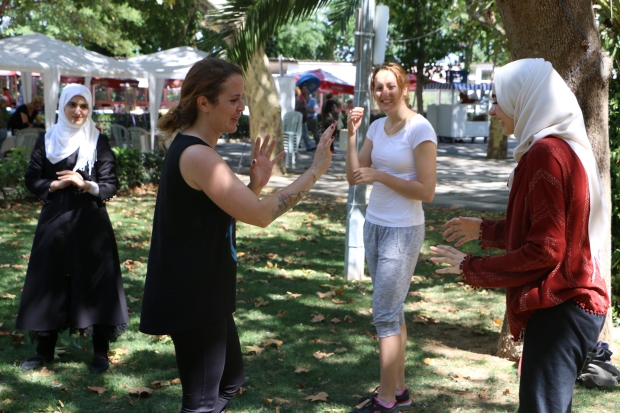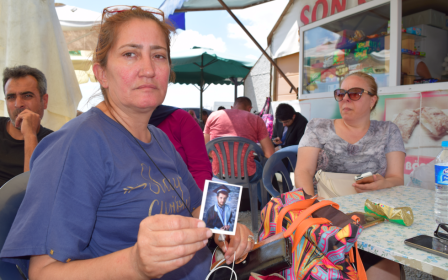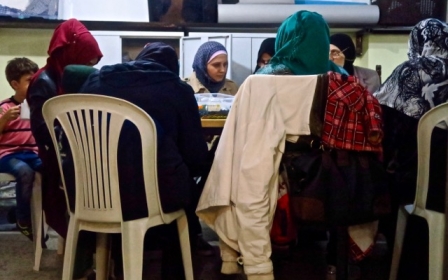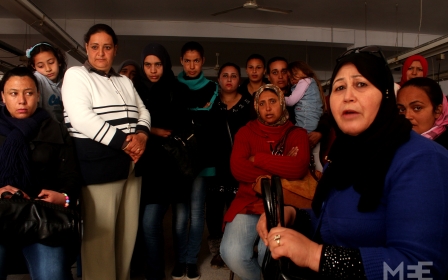Turkish 'campus witches' fight against harassment and abuse
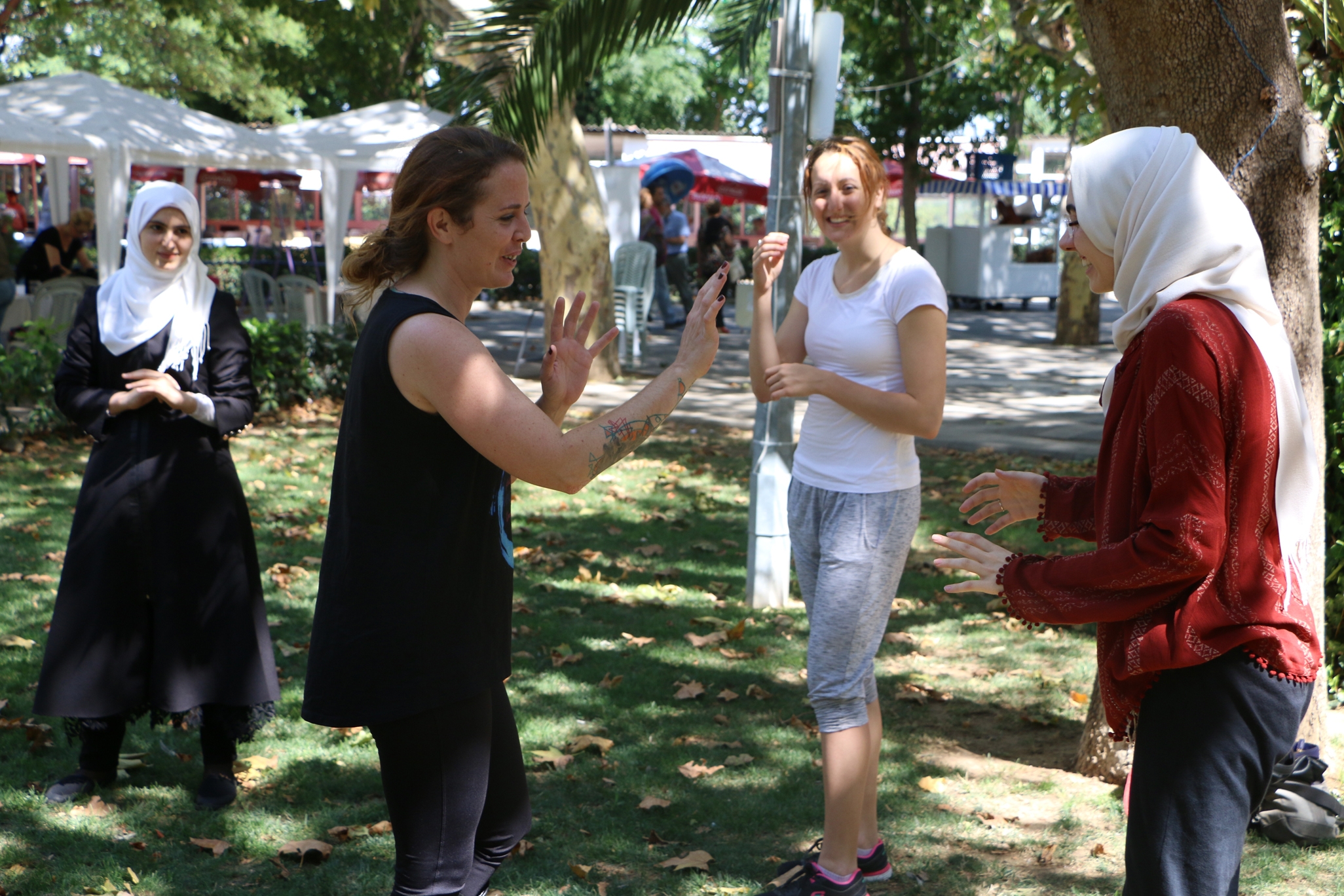
ISTANBUL, Turkey - A man sitting at an outdoor table is suddenly set upon by a group of young women, who furiously rain blows on him. The women shout, accusing him of sexual assault while some onlookers cheer and chant, "Long live women's solidarity" and "Let this be an example, no one can harass women." After a while, security guards step in and take the man away.
The video of this incident at Ankara University campus has gone viral and called attention to a group of students who are increasingly confronting men they accuse of sexually harassing or abusing women.
In the garden of a cultural centre named after the communist writer Nazim Hikmet sit two fierce-looking young Turkish women. Juliana Gozen and Ceylan Cansaran have similar nose piercings, but Gozen wears bright lipstick while Cansaran is make-up free.
They are part of a group that calls itself the "campus witches," which is organising in 20 Turkish universities with the aim of taking the fight of sexual harassment directly to the perpetrators.
The witches formed about three years ago and are most active in Istanbul, Ankara, Izmir, Adana and Mersin, but only acquired national fame recently, after the video went online.
Cansaran said the girl in Ankara submitted a report that she was raped to the police, but they claimed they had insufficient evidence to help. The witches say that the school administration also declined to investigate, leaving the student to see her attacker almost every day. The male student denied the allegations and has never been charged in relation to the assault.
"He raped a female student, but refused to leave the school," Gozen said. "Members of our witches group in Ankara warned him multiple times, but he didn’t take it seriously. So we decided to intimidate him in this way."
The witches remain unapologetic about the attack and say that sometimes it may be the only way to obtain justice in Turkey, where violence against women is all too normal.
A UN women’s rights committee last month found that 36 percent of Turkish married women are subject to physical violence from their spouses. According to Gozen and Cansaran, the fact that men easily get away with harassment contributes to the eventual normalisation of violence.
"It’s a reality we have lived with for generations," Gozen said. “A man just can tell his friends over a cup of coffee how he hits his wife. That’s how normal it is.”
Post-coup threats
Following the failed coup in July, many women have grown even more afraid.
“What we are seeing now is more men on the streets, in uniforms and in politics,” the women’s parliament group of pro-Kurdish HDP MPs said in a recent statement. “Their struggle was not for democracy, but for power.’’
Gozen said this time in history may be a breaking point for women’s rights. "Change has to come now, or we will be lost.”
She said the only way to fight back is to show women they do not have to tolerate harassment and that they have a support network to fall back on, while demonstrating to men that “filthy” behaviour will not be tolerated.
Zeki Hashas is a graduate of Mimar Sinan University who said he does not support violence, but adds that it might sometimes be necessary to convince Turkish men to stop abusing women.
"Unfortunately, beating women is common in Turkey,” he told Middle East Eye. “We do nothing about it, so women must do something.”
Others, however, have been less welcoming of the witches’ methods.
The group chose its name because it wanted to be seen as doing good, using its power to heal society, but in the end, the male student they attacked in the video was able to get them expelled, while he walked free for lack of evidence.
The witches website, where women post profiles of men they accuse of harassment, has been repeatedly hacked.
But Gozen says no amount of pushback will stop her from spreading the word.
“They say bad things about us and are trying to put the site down, but we already have a backup website,” she said. “They won’t stop us."
Self-defence
The witches are also working on improving women’s self-defence methods, organising free lessons and private courses throughout Istanbul.
Maya Ergun, one of the course instructors, teaches a small class in Wing Chun, a style of Kung Fu, every Saturday.
"You know, people often say that ‘we have to teach men to leave women be,’ which is of course important," Ergun said. "But it’s equally important to help women to find their own strength. Self-confidence makes a difference in dangerous situations."
Ergun, whose arms are covered with colourful tattoos, said she thinks Turkey’s women could stand up more for each other.
"I was once on a minibus in Istanbul, all dressed up, going to a birthday party," she said. "I sat among some older ladies, and one man stepped in."
The man began asking Ergun inappropriate questions and touching her. He ignored her repeated calls for him to stop, but the “women just sat there and did nothing,” she said.
“At the end of the ride, I was so angry that I kicked the guy as he got off the bus and started punching him,” she said. “But I was mostly upset with the women."
That incident made her decide to do something about the constant abuse women endure.
Irem, who did not want to give her full name for fear of harassment, said she got involved with Hollaback Istanbul, a women's organisation fighting against street harassment, after enduring several highly uncomfortable situations.
"Even simple things like going to my university by bus - people would stare or make comments about the way I look, talk or sit. Both men and women,” she said.
Like many women in their early twenties, Irem said her generation has been more willing to open up about harassment.
"If my mother and I would walk down the street and a man behaved in a harassing way, we would say, 'that’s weird,' and not talk about it," she said.
But the mood is changing as more women study in universities, have careers and participate in city life, which is helping bring the issue to the forefront.
Social media has also played a part in raising awareness, and young women point to role models like US singer Beyonce, who has publicly supported feminism.
In February 2015, after 20-year-old student Ozgecan Aslan was brutally raped and murdered in a minivan on her way home from a day of shopping, thousands of women across the country took to the streets.
The women of Hollaback point to this as a turning point. "She was in a minibus, the kind women use every day. Everyone felt, 'This could have been me. This could have been my daughter'," Irem said.
“It’s not about social class, power or status. It's about the things our whole society does that affect the way women are perceived."
Still, marginalised groups continue to fall through the cracks. Syrian refugee women, more than a million of whom are living in Turkey, are the most vulnerable.
Self-defence teacher Ergun said that while young, well-educated women have become more outspoken in recent times, refugees are all too often left with no voice.
She now teaches a free self-defence course for female refugees twice a month in Istanbul, but says it is only a very small part of a much bigger puzzle.
"Most of them [female refugees] are afraid of the police here and don’t know how to access institutions that might help them,” she said.
"I hear their stories in my class because they come with these questions [about their safety]," she said. "They live in really bad neighbourhoods and don’t have proper locks on their houses. They are confronted with frightening situations."
Landlords and bosses who employ them illegally are often the causes of problems, she said, before adding that little by little, she is making progress.
An elderly Iraqi women at her class started off the session by asking: “How can a woman ever defend herself? A man is always stronger."
Halfway through the class, she pulled Ergun aside and told her: "Maybe we women can defend ourselves. I will teach this to my daughters too."
New MEE newsletter: Jerusalem Dispatch
Sign up to get the latest insights and analysis on Israel-Palestine, alongside Turkey Unpacked and other MEE newsletters
Middle East Eye delivers independent and unrivalled coverage and analysis of the Middle East, North Africa and beyond. To learn more about republishing this content and the associated fees, please fill out this form. More about MEE can be found here.


